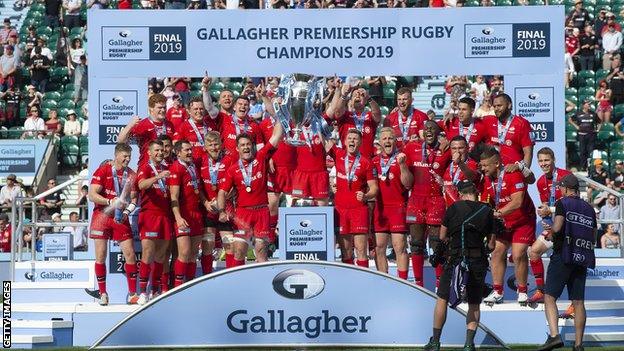Premiership Rugby: Titles should be stripped for future salary breaches, says review
- Published

2019 Premiership champions Saracens were docked 35 points and fined £5.3m for breaching the salary cap in each of the past three seasons
Premiership clubs who breach the salary cap in the future should face a punishment that "fits the crime", including possible stripping of titles and suspensions, according to a damning review of the rules.
Other recommendations, in what would be a radical overhaul of the salary cap regime, include "stronger investigatory powers" and making Premiership Rugby, club executives, players and agents more accountable.
The review, undertaken by former government minister Lord Myners on behalf on Premiership Rugby, came after reigning champions Saracens breached the salary cap in each of the past three seasons.
The London club were docked 35 points and fined £5.3m for the breaches and then automatically relegated after failing to prove the club would comply this season.
Yet there was no power for Premiership Rugby (PRL) to remove the titles the club had won when they were operating outside of the salary cap.
In a 55-page review published on Thursday, Lord Myners wrote: "It is important that my recommendations should be viewed as a package of measures which, if taken together, will go a long way to restoring the integrity of the regulations.
"They should not be viewed as a menu of options from which to pick and choose."
In addition to the proposed strengthening of sanctions, Lord Myners said he has "sympathy" with clubs that wanted to end the system of having two marquee players whose salaries do not fall within the cap.
"There are some existing areas of the regulations that are obviously not widely supported. Quite a few clubs expressed a desire to end the marquee player system on the grounds that it is inflationary, over complex and unnecessary. I have a great deal of sympathy with this position."
He did not propose seeking an "alternative mechanism" to the salary cap, having found that it will "continue to achieve its objectives" if applied robustly.
Lord Myners was not tasked with commenting on the level of the cap.
A series of additional measures were also considered as part of the review, including disciplinary hearings in public, the publication of player salaries and further restrictions on salaries and image rights payments.
However, Lord Myners said he had been convinced by clubs that "these more draconian measures are not necessary".
He said he would have "no hesitation" in recommending them "if future violations continue to the detriment of the economics and reputation of PRL and the game more broadly".
'Judge and jury'
Myners says Premiership clubs must not in the future "act as judge and jury for fellow competitors", as was the case both in 2015 and in 2019.
From 2015 Myners cites "a last-minute settlement of the salary cap breach against Saracens", as well as a second incident involving another club in the same year.
He also references the "rushed changes to the regulations" which saw Saracens issued with a further 70-point deduction and relegated from the Premiership in 2019.
Myners has also called for the appointment of an independent cap governance monitor, and has demanded greater powers and support for the salary cap manager.
However, Premiership Rugby has not committed to implementing Lord Myners' recommendations and responded by saying there will now be a consultation with clubs and stakeholders.
Darren Childs, chief executive of Premiership Rugby, said: "Premiership Rugby established an independent review of the salary cap because we want to ensure that it provides a world-leading framework for the future.
"We are immensely grateful to Lord Myners for his thorough and insightful work during an extensive review process.
"We welcome the comprehensive set of recommendations put forward by Lord Myners following the review and we are pleased to publish his report so that everyone has an opportunity to consider his conclusions.
"In the next stage of this process, we will consult carefully with our clubs and other stakeholders as we finalise the new salary cap regulations for the long-term benefit of our sport."